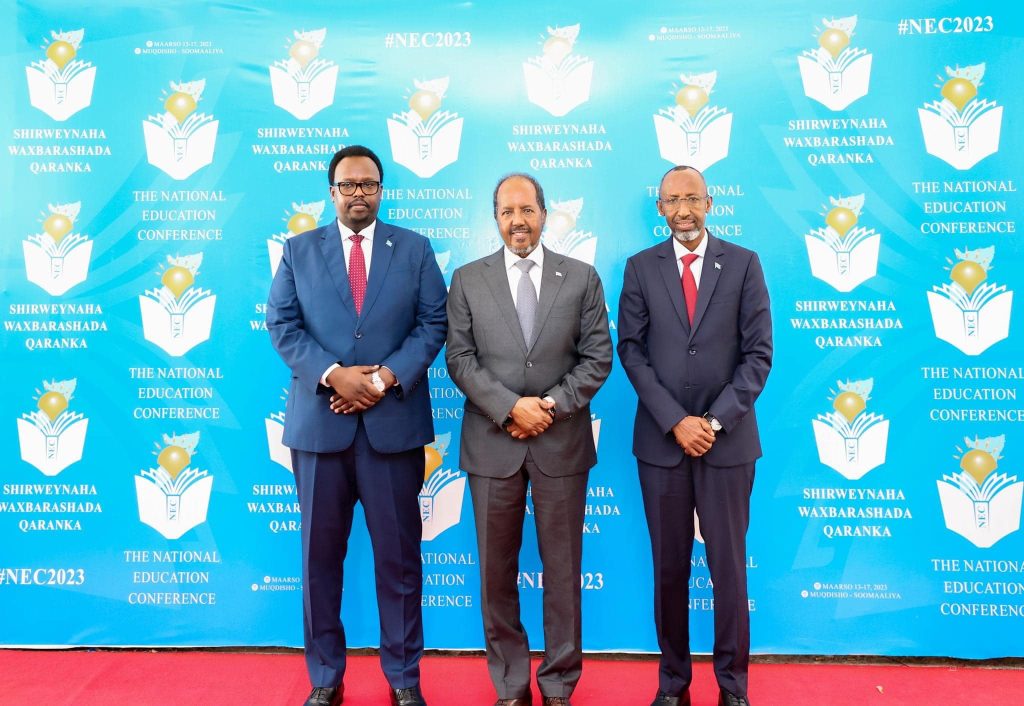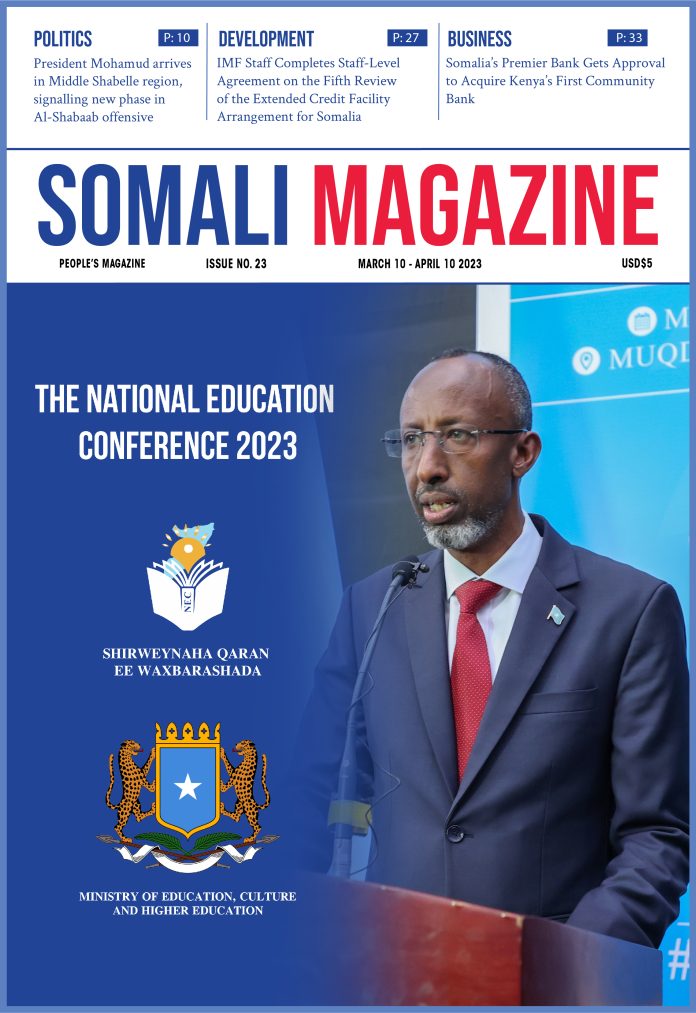The Ministry of Education and higher Education of Somalia on Monday hosted National Education Conference which aims at seeking practical ideas and recommendations on enhancing accessible quality Education for the country.
The conference brought together about 250 participants, including high-level government officials, scholars, education practitioners, the private sector, civil society, and international partners.

President of the Federal Republic of Somalia, Hassan Sh. Mohamud, Minister of Education and Ministers from Federal Member States are delivered speech during the opening event.

The objectives of the conference was: (1) to agree upon the aims, goals, and outcomes of national education; (2) to initiate ideas about expanding access and improving the quality of education; (3) to explore a governance system
that can provide effective management of the education sector; and (4) to present innovative and visionary ideas that address the existing challenges.
The conference brings together stakeholders in the education sector among them current and former education ministers, ministers from the Federal Member States, and education experts among others.
In pursuit of its vision to rebuild the Somali state, the Federal Government kicked off the country’s National Education Conference to bolster one of the key institutions of any nation, the education sector. The conference was opened by President Hassan Sheikh Mohamud who streamlined in his presidential manifesto in May 2022 the goal to expand access to education to children of all ages.
The President’s manifesto was also anchored in a commitment to bolster access, quality and management of education in the country. At the opening of the conference, the president called on the government to actualise equal opportunity for all Somalis to quality education
In his opening speech, President Mohamud said he was foremost a student who along with the education minister made strides in education that are unprecedented in the country’s history.
STUDENT ENROLLMENT
The president also added at the conference that the current administration plans to raise the number of enrolled students in the country’s education sector. He added that this access should also be extended to the pastoralist and marginalized communities who are in dire need of educational services. Additionally, cognizant of the role of teachers in the education sector, the president expressed the government’s plan to provide expert training opportunities to at least 10,000 Somali teachers across the country. This plan is also part of the current administration’s effort to achieve political
Education minister Farah Abdulkadir also reiterated the president’s point that every child must have access to quality education, regardless of age and background. He also added that education remains the foundation and the cornerstone of a thriving society and a prosperous future.

KEY OUTCOMES
Among the outcome of this National Education Conference are the following summed up. Firstly, the highest priority ought to be given by the ministry to quality basic education that is affordable to all students across the country. Additionally, the status of the Quran in the education sector, should be reviewed in a bid to provide integrated education, especially in grades 1-4. The ministries of Education and Religious Affairs were tasked to investigate the conditions and challenges in Quran schools. Kindergarten
are also encouraged to invest in the high school education sector to develop it. Thirdly, as mentioned above, special attention is given to the training of the teaching personnel to equip the teachers. Fourthly is the focus on the private education sector i.e., private schools. The ministry to this end strongly will promote private education and establish world-class private schools to respond to the growing demand for education services. furthermore, private education schools ought to emphasize science, technology, engineering, mathematics and Languages.
Fifthly, the education sector ought to also focus on the advancement and progress of the Somali language. Sixthly, cognizant of the role of media in the advancement of the specific government sector, the minister of education suggested that the government media should be used to broadcast.
A five-day national conference on education in Somalia is opening in Mogadishu today where President Hassan Sheikh he delivered his keynote remarks.
According to the programme of events seen by Somali Magazine News, the conference which brings together over 250 participants from the education sector is hinged on the theme ‘Transforming Society through Relevant and Quality Education.’
A background note for the event noted that the conference ‘intends to seek practical ideas and recommendations that envisage organized, accessible, quality, and inclusive education anchored in the national needs, values, and aspirations.’
According to the Ministry of Education, only 24% of formal primary school- aged children and 22% of formal secondary school- aged children attend school. UNICEF estimates that 3 million school-age children are out of formal schooling, which is more than 70% of the school-age population.
Some of the key issues to be discussed at the conference include national education goals and outcomes, education as a national agenda, governing education in a post-conflict context and the role of art and media in education. Others are governance and financing of education, quality higher education, decentralization and financing of education, inclusive teacher development, recruitment and retention and to revise the national curriculum to better suit it to the specific Somali context.
It is also worth noting from the onset that the president, prime minister Hamza Abdi Barre and the Minister of Education, Culture and Higher Education Farah Abdulkadir are long-time education personnel.
stability, socio-economic development and national prosperity for the country.
A total of 450 participants were present at the conference held at Jazeera palace Hotel among them education stakeholders, parents and representatives from the federal and state governments in addition to the members of the international community.
curriculum and education are also to be improved and developed under the ministry of education’s plan.
Secondly, higher education will be prioritized according to the needs of the community as well as integrating education into the curriculum. Private investors and donors education and focus on the operation and utilization of different types of media to educate the public about the importance of education. Another outcome of the conference was that special needs and disabilities students’ needs ought to be on the priority list of the education sector.

